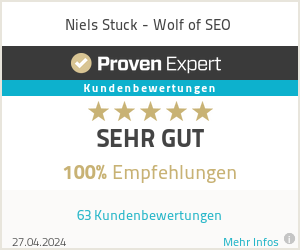
What is a good quality score and, perhaps more importantly, how can we improve it to lower our cost per click?
The best of your Google AdsGetting the most out of a pay-per-click account can be a full-time job for even the most experienced pay-per-click managers.
It's important to keep an eye on and monitor your account's metrics - should we care about quality scores too?
When it comes to your Google Ads-The quality score is not as important as, for example, your budget optimization or performance indicators. The cost per acquisition and/or the return on advertising spend come first here.
But it's still an important metric that you should understand and maintain.
So, what is the quality score?
Google's description of Quality Score (QS for short) states, "The quality score is calculated in real time every time your Keyword matches a search query" - that is, every time your Keyword has the potential to trigger an ad.
What does a high Quality Score mean? It is used in several ways, including to influence the actual cost per click (CPC) of your keyword and to estimate the bids on the first page of your account.
It also determines, in part, whether a Keyword can participate in the ad auction that takes place when a search query is entered, and if so, how high the ad is ranked.
The quality score of your ad group is made up of the score of each keyword you target.
Components of the quality score
The score is constantly changing, the following elements are used to calculate the score:
- Keyword-click rate
- The Relevance of the keyword within its ad group
- The Relevance of the keyword
- Your account history
- The historical CTR of the display URLs in the ad group
- Yours Landing Page Experience
- Loading times of the Landing Page
- Device and location dependency
Click-through rate (CTR) of the keyword
The click-through rate is the number of clicks your ad receives divided by the number of ad views (impressions) that occur through Google search only.
As already mentioned, the KeywordClick-through rate is the most important factor in determining your quality score.
Each display and each Keyword has its own CTR, which is based on the performance of your campaign.
The click-through rate is the most important component of the quality score because it directly indicates which ads are most relevant to our users.
A targeted Keywordthat shows a similarly targeted ad, for example, is more likely to have a higher CTR than a generic Keyword with unspecific ad text.
The more your keywords and ads have to do with each other and your business, the more likely a user is to click on your ad after searching for your Keyword-phrase has sought.
The relevance of the keyword for the ad text
The keywords in your ad group must be relevant to your ads. If possible, the keywords of your ad group should be repeated in the ad, but of course there are cases where this is not possible.
Search term and display for the search query
The KeywordThe keyword that a potential visitor searches for (triggered by the underlying search query) must be relevant to the keywords in your ad group and the ad itself.
It is important to know that the match type is not taken into account when Google calculates the QS.
The CTR history of your account
This is often surprising, but Google takes your entire history into account when determining CTR. Don't be fooled into thinking that this means you should limit the changes in your account.
Google prefers recent account history and is therefore suitable for advertisers who are constantly improving their accounts.
The Google AdWords Agency blog even says: "A few bad testing days won't ruin your quality score. In order to optimize your clients' accounts, we recommend you to run targeted tests for your bids, ads and keywords.
The moral of the story: don't be afraid of change, keep testing and keep improving.
The historical CTR of display URLs
This QA measurement refers to the URL, which is shown in the display, and not to the targetURL, to which the visitor is redirected after clicking on the ad.
It goes without saying that this should be relevant to the keywords in your ad group.
The "quality" of your landing page
Google notes that the three most important components of a high-quality website are relevant and original content, transparency, and navigability.
The Relevance comes first, i.e. visitors should be able to easily find what your ad is promoting, i.e. the content of the page must match the ad text.
Google regularly reviews your landing pages to calculate these and other usability factors.
Loading times of the landing page
Reduce the loading times of your Landing Page, this is a must. As with organic search, landing page load times are an important factor in calculating the quality score.
The easiest way to improve load times is to host your website in the place where you receive your customers, i.e. if your customers are mainly from the UK, you should not host your website in the US.
Relevance
As you can see, the term "Relevance" is very common here, and that is the key. Your Keyword should refer to the ad title, the ad text, the adUrl and finally refer to the page of your website that your ad is targeting.
In general, you should aim for a QS value of 7 or better. If you see a QS value below 3, you have serious problems that you need to address.
What is a "good" quality value?
The values from 1 to 3 are the lowest points on the evaluation sheets and expensive. With a value of 1 and 2, your ads will probably not be displayed at all or the impressions are extremely low.
The Google benchmark for the average is 6.
Therefore, "good" is considered above average or 7+.
Values 9 to 10, on the other hand, are as good as perfect, as shown below
Okay, is that all? Not so fast...
We've looked at what quality score is and how it works - but don't get too fascinated with quality score.
Quality score affects your ad rank, your ad rank affects your cost per click (CPC), but the most important thing to focus on is your cost per acquisition (CPA).
Of course, we should care about the quality score, but in the end, it's the CPA that determines whether your ad business works or not.
It often boils down to the fact that the entire experience with the search term, the ad text, the Landing Page and the product or service offering must match.
... and the quality rating can not change the latter!
Just remember the golden rule:
- Relevance is for Google
- Continuity is for the user
Quality assessment tracking script
If you know about scripts, you can implement this script that tracks and graphs the quality score on a daily basis:
google quality score script
The graph gives you an overview of the state of your account. So you can find out where you need to improve the structure of your ad groups and the like.
How do you fix a low Quality Score?
Let's correct or remove the keywords that are affecting the performance. As mentioned above, the CTR is an indicator of Relevance. A low CTR means that users find your ad irrelevant to their search.
We need to change that:
Include the keyword in your ad text.
Revise ads with a low click-through rate and include relevant keywords with high volume in the ad text.
Make sure your ad extensions are added and enabled (especially callouts and sitelinks), and match them to the campaign and ad group.
Improve your landing page.
Don't stuff your page with keywords, seriously - that doesn't work. Basic on-page SEO techniques and good practices are enough.
Make sure your content is original and useful (written for people, not search engines).
Pay attention to speed and usability. Perform a test of the page speed.
Also, look at Google's landing page guidelines to see if there are areas you need to improve.
Pause and move the keyword to a more relevant ad group.
Ad groups that are related in terms of topic and content are the be-all and end-all for success.
Parts ad groups by Keyword-targeting and intent. This way you can match the search intent of the keyword with your ad.
Do not hastily delete newly added keywords. Keywords need time to generate enough impressions and to achieve a meaningful quality score.
Below I have compiled some frequently asked questions for you:
Quality assessment questions, answered
Q: What does a high quality score mean?
It indicates that Google's algorithms think that you match the keywords well with the ad text, and that your Landing Page is good to very good.
As a result, you will be rewarded for your efforts with more ad views and a higher click-through rate.
Q: Do paused keywords affect the quality score?
Yes - paused keywords will affect the quality score of your ad group, as they have affected the historical performance. Deleting them will not change this either.
However, it will improve over time as historical data has less impact on the current value.
Q: When and how often is the quality score calculated?
Google calculates your actual score each time an auction runs, based on the data available at that time.
The value you see in your AdWords account is an estimated (blended) value.
Q: How can the quality score for geographically targeted keywords be improved?
The easiest method is to include city, area and even zip codes in your search terms. Of course, you should also include your location in your ad text and on your Landing Page mention.
I would try an ad group for broad keywords where you add your noun and leave your location broad.
For example, "+grocery +shop in Leicester". It's not perfect, but it's better than nothing.
Q: Does creating a landing page with keywords that match the ad text and ad group improve QA?
Congruence plays an important role. If you use the title and text of your Landing Page it helps in the short term, but not if people don't click on your ads over time.
Improve your Keyword-/ad CTR and watch the performance of your Landing Page in Analytics - first the people should be satisfied, then Google.
Q: Is it possible to find out a competitor's AdWords quality score?
Unfortunately not, that would be an unfair advantage. You could ask them... but they would probably tell you to fuck off 😉 .
You can compare your performance with Google AdWords Auction Insights, which will give you an idea of how you're doing in the bidding war with your nearest competitors.
Also, there are quite a few free and paid tools that give you insights into your competitors... but I wouldn't get too hung up on them.
Q: How long does it take for the Quality Score to increase after a new campaign is launched?
It takes both [a little] time and about 1,000 ad impressions for a single Keywordto normalize. Until that time, your scores are very volatile and probably irrelevant. So a little patience is in order!
Q: If the top ad has the best quality, why don't I just copy its ad to get a higher score?
Because it could be due to a high bid and a higher ad rank, not just a high QS!
Moral objections or not, don't mimic your competitor - be different - write a better ad and create a more compelling one Landing Page.
Try to add engaging callout extensions, sitelinks, and structured snippets to your ad groups.
Optimize your ad extensions and constantly look for ways to improve them by adding value. Ad extensions can attract a considerable number of clicks and increase your Click-through rate increase overall.
Next step: Get the only step-by-step framework for Google Adsthat tells you exactly what to do from setup to ad optimization. Trusted by over 1,700 PPC managers, get the God Tier Ads Framework.
« Back to Glossary Index




 By
By 